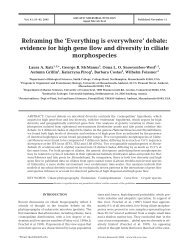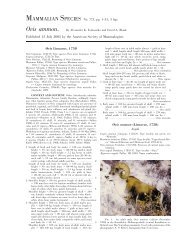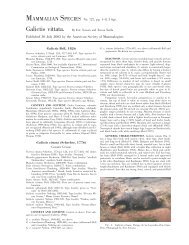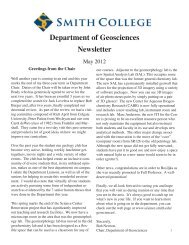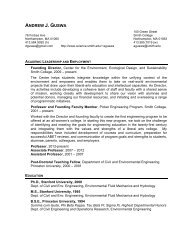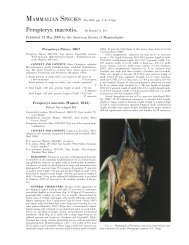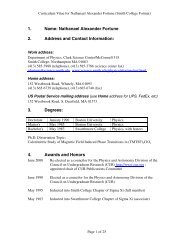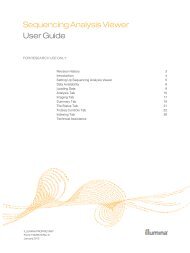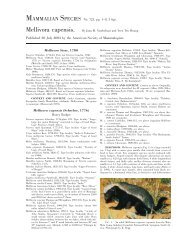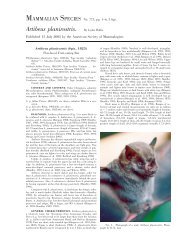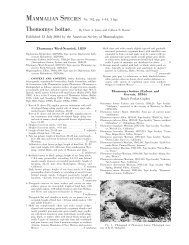Brugia Malayi - Clark Science Center - Smith College
Brugia Malayi - Clark Science Center - Smith College
Brugia Malayi - Clark Science Center - Smith College
You also want an ePaper? Increase the reach of your titles
YUMPU automatically turns print PDFs into web optimized ePapers that Google loves.
Wind-Diesel Microgrid System for Remote Villages in Kenya<br />
June Lukuyu<br />
Electricity has proven to be a major contributor of global socioeconomic development. It is the foundation for urbanization<br />
and industrialization, which results in a higher standard of living for the people who have access to electricity. Electricity has<br />
been confined to urban areas and for this reason several countries, especially less developed ones are lagging behind in terms of<br />
socioeconomic development. Kenya, like most countries in Sub-Saharan Africa, is faced with the problem of limited electricity<br />
access especially in rural areas. To address this issue, my research proposed the use of wind-diesel microgrid systems to achieve<br />
rural electrification.<br />
A microgrid is a small-scale power supply network that is designed to provide energy for a small community. As used<br />
in this project, a wind-diesel microgrid system combines diesel generators and wind turbines alongside additional equipment<br />
such as batteries, power converters and various control systems to generate electricity. A remote village in Northern Kenya,<br />
Marsabit, which is currently being served by an off grid wind-diesel system was used as a case study. A power flow model of<br />
the hypothetical Marsabit wind-diesel generation, transmission and distribution network was developed to simulate and analyze<br />
the reliability of the system. The percentage of wind capacity and diesel energy going into the system to serve the 17 % annual<br />
increase in demand for electricity in Marsabit town over a period of eight years was examined as an indicator of system reliability.<br />
Using the power flow model, system reliability for different scenarios based on different sizes of diesel generators and different<br />
wind capacity were analyzed.<br />
Results from the comparison of the different scenarios showed that the wind-diesel microgrid system tends to be more<br />
reliable if the diesel generator capacity is increased as opposed to wind capacity during power system expansion to meet the<br />
growing demand. This is owing to the fact that wind power tends to have a low capacity factor and has an intermittent nature.<br />
Nonetheless, these technical issues can be dealt with through grid control but this consequently increases the cost.<br />
The findings of this research will be presented at the annual North American Power Symposium at the University of<br />
Illinois, Urbana-Champaign, in September 2012. (Supported by the Schultz Foundation)<br />
Advisor: Judith Cardell<br />
References:<br />
1<br />
H. Ibrahim, R. Younès, T. Basbous, A. Ilinca, M. Dimitrova, Optimization of diesel engine performances for a hybrid wind–diesel system with compressed air<br />
energy storage, Energy, May 2011. Vol 36, Issue 5, Pg 3079-3091<br />
2012<br />
107



